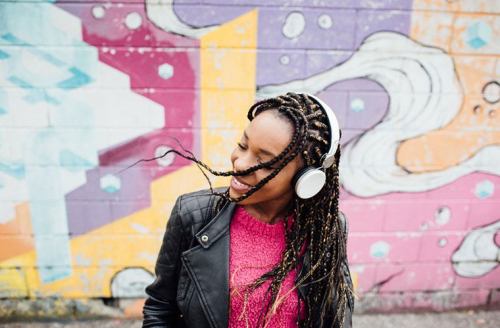Our editors independently select these products. Making a purchase through our links may earn Well+Good a commission
How to recognize your daily and monthly happiness sweet spots
Your happiness levels are linked to the hormones in your body. Here's when your happiness levels peak, based on your hormone cycles.

Who hasn’t experienced a 4 p.m. blood sugar crash that left you nearly immobilized at your desk, willing a triple latte to appear while you scowl at your computer screen? And even if you’ve chosen a life path that fills you with deep satisfaction, have an amazing network of friends and family, and consistently get enough sleep (a seriously important happiness-maker), you might still find yourself feeling disconnected and sad just before your period begins each month. That’s because there’s a chemical component to happiness that you can’t entirely control—but that you can begin to take note of, and put into context.
“The happy hormones are estrogen and oxytocin, which support each other.” says Sara Gottfried, MD, author of The Hormone Cure. “Thyroid, cortisol, and progesterone also play a role in mood,” and all of which can fluctuate throughout a woman’s monthly cycle.
Even without getting physical or seeking out a caffeine buzz, we all have an inherent cycle of mood.
While the negatives, like PMS and blood sugar crashes, tend to be more obvious, our hormones can peak in ways that are downright euphoric, too. Think about how you feel after a class with your favorite yoga teacher or a long run, or after an orgasm. Even without getting physical or seeking out a caffeine buzz, we all have an inherent cycle of mood. So chemically speaking, when is our happiest hour each day?
Well, just like the rest of happiness, it’s complicated.
What is clear, though, is that women have a natural monthly happiness cycle, and that we should be embracing what I’ve started thinking of as the PMC—pre-menstrual celebration. “For most women, day 9 to 12 of the menstrual cycle is a time of peak happiness because testosterone is highest and estrogen is rising,” says Dr. Gottfried, with the caveat that every woman’s cycle is unique. “There’s always some variation woman to woman, but unless you’re on a birth control pill or otherwise [interfering] with your monthly natural hormonal cycle, that’s when you feel your best.”
It’s easy to blame our periods when PMS rolls in and you’re moody and exhausted, but how about giving your cycle the credit it deserves for that early-in-the-month boost that comes as your hormones rise? It’s worth noting the amazingness of the female body, and making that celebration into something of a monthly ritual.

When it comes to mood throughout the day, there’s much more individual variation than with our monthly dance of hormones, says Loren Wissner Greene, MD, an endocrinologist and OB-GYN at NYU Langone Health. Our bodies recharge overnight, producing mood-affecting hormones that peak at predictable times—for example Dr. Wissner Greene says that normal production of cortisol is highest between 4 a.m. and 6 a.m., not because we’re stressed then, but because that’s just when the body deals with cortisol.
But while we all wake up from a full night’s sleep with a fresh slate for the day, our internal clocks, and how we connect to circadian rhythms, are unique. “Not everyone feels like they’re a morning person,” says Dr. Wissner Greene. So the first step in making the most of your personal happiness cycle is to determine whether you function best first thing in the morning or as the sun goes down.
Night owls might have a harder time embracing their happiest time of day, Dr. Wissner Greene says, because so many work and school schedules are set up with morning people in mind. “We tend to keep ourselves going with more coffee instead of more sleep,” she says, which can be detrimental to our hormone production (AKA, you now know, the key to happiness).
It’s crucial to remember that all those happiness hormones interact with the greater context of our lives, Dr. Wissner Greene says.
It’s also crucial to remember that all those happiness hormones interact with the greater context of our lives, Dr. Wissner Greene says. “Are you working late and can’t wait to get out of work? Are your staying home with kids, can’t wait until relief comes when your partner gets home? Mood is so dependent on what’s going on in our lives we often don’t understand what the body is telling us.”
Dr. Gottfried concurs that happiness is a blend of several elements, and that while some may be fixed, there are things we can do to hit a mindful peak each day and month. “There is absolutely a synergy between lifestyle, behaviors, goals, hormonal health, and mindset,” she says. “Cultivating happiness is associated with astounding benefits to our health. It reduces cortisol, gives higher immunity, lowers disease rates, and improves longevity,” according to UC Berkeley’s Greater Good: The Science of a Meaningful Life.
Her top tips for cultivating a healthy balance and keeping the little chemical factory inside your body working optimally include getting enough sleep, interval training to regulate cortisol production, drinking less, practicing gratitude, and removing as many estrogen-disrupting chemicals from your environment as possible. “The good news is that there are several strategies to recruit optimal hormonal health,” Dr. Gottfried says. “It’s about adding positive lifestyle choices rather than simply spot-fixing any problem areas.”
Another way to increase your happiness: Hang out with happy people. And here are 4 Buddhist-approved ways to boost your mood.
Sign Up for Our Daily Newsletter
Get all the latest in wellness, trends, food, fitness, beauty, and more delivered right to your inbox.
Got it, you've been added to our email list.










